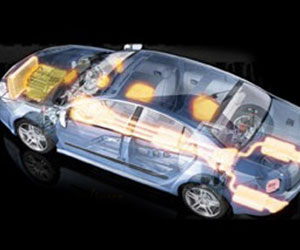 This is a late blog post. I attended and presented at the 2012 Thermal Management Systems Symposium in Scottsdale, AZ on Oct 31st and Nov 1st. It focused on the latest and most pertinent topics in the field of thermal systems technology today. These are my notes on three notable presentations (and my take always), specifically in engine thermal management and related fuel economy benefits.
This is a late blog post. I attended and presented at the 2012 Thermal Management Systems Symposium in Scottsdale, AZ on Oct 31st and Nov 1st. It focused on the latest and most pertinent topics in the field of thermal systems technology today. These are my notes on three notable presentations (and my take always), specifically in engine thermal management and related fuel economy benefits.
It is interesting to note before I start that I saw a lot of commonality among car manufacturers in the technologies they were exploring for fuel economy improvements, generally combining many of strategies together to improve the fuel economy performance.
Fuel economy improvement during engine warm-up
The first presentation that I have copious notes written for was a presentation by BorgWarner on fuel economy improvement during engine warm-up. They talked about the use of a dual mode pump (electric and mechanical) which can reduce the parasitic loads and frictional losses of the engine. They presented a clever implementation of shutting off the coolant pump during the first few minutes of start-up, combined with running it on an electric mode when lighter work load was needed. They presented a case where the frictional losses were reduced by 2.9%. They showed a cold FTP 75 cycle fuel economy improvement of 1.13% and a cold NEDC fuel economy improvement of 1.9%. This is a space I would watch closely to see how much of this is materialized in the coming year(s).
Engine frictional losses during warm-up
Reducing the size of cooling circuits
The third paper of interest was a paper from Valeo (Dr. Azzouz) on the use of phase change materials (PCM) to reduce the size of low temperature cooling circuits. The premise here was that today’s cooling systems are generally designed for “excessive heat loads”, and hence are oversized for most driving modes. The idea is to use an accumulator filled with PCM (with exceptional high heat capacity, order of magnitude higher!) in series with the radiator that can store excessive heat generated during extreme operating condition and dissipate it during periods of low heat. The bottom-line impact was a radiator downsized by 20-30%, a volume savings of about 21% and weight savings of about 14%.
It is generally understood that all of the low hanging fruit to make big improvements in the fuel economy is already taken. The future strategy and roadmap lies in implementing many strategies with smaller benefits to fuel economy, and combining many (or all) of these strategies to achieve a better fuel economy performance. Many of these strategies don’t necessarily easily work together and the onus is on the vehicle integrators to analyze the interactions and trade-off among each of these strategies and devise an active control system to take advantage of many of the fuel economy improving strategies together.

